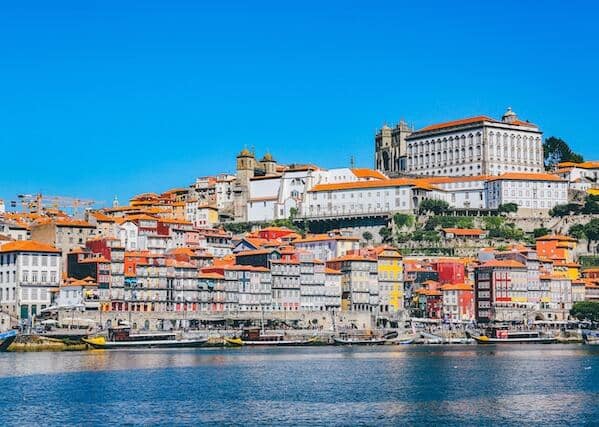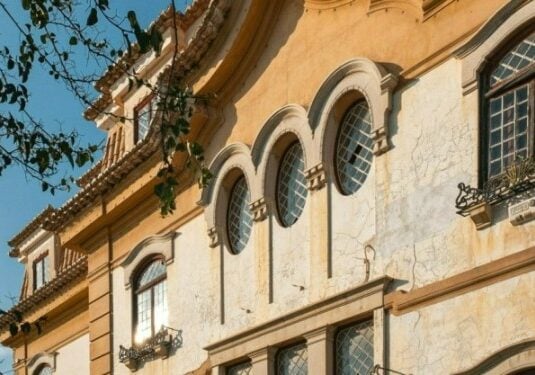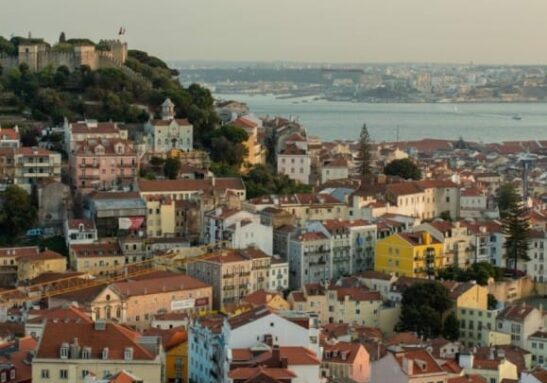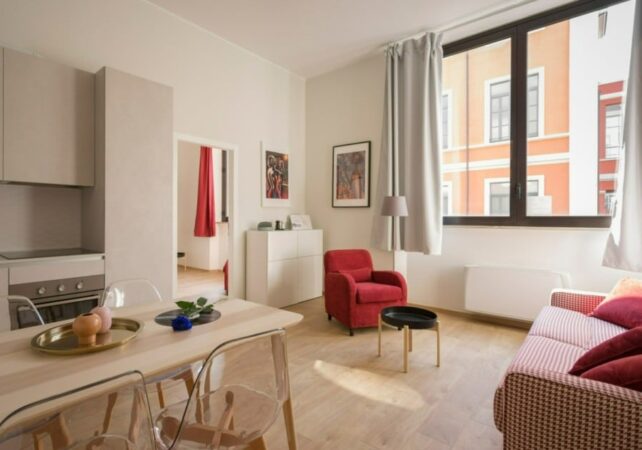Updated: December 17, 2025
 Many international buyers are seeking to invest in Portuguese real estate. Every real estate owner must pay property taxes in Portugal. The rate varies from 0.3 to 0.45 percent of the total value of an urban property and 0.8 percent for a rural property.
Many international buyers are seeking to invest in Portuguese real estate. Every real estate owner must pay property taxes in Portugal. The rate varies from 0.3 to 0.45 percent of the total value of an urban property and 0.8 percent for a rural property.
Portugal considers all its citizens, residents, and non-residents as taxpayers, and their legal status affects the tax rates. For example, the taxes for capital gains and rental income differ between residents and non-residents.
As a property owner, you pay taxes to the Portuguese tax authorities every year, regardless of whether you are a foreigner or a local. In this guide, you can learn to calculate your taxes, apply deductions, and understand the regional adjustments.
Read more about:
Taxes When Buying Property in Portugal
People pay taxes when they invest in Portugal real estate. The Portuguese property taxes differ depending on the investment stage and the type of property.
 Property purchase tax (IMT)
Property purchase tax (IMT)
 The Imposto Municipal sobre as Transmissões Onerosas de Imóveis (IMT) (Municipal Tax on Onerous Transmissions of Real Estate) is a transfer tax levied over the purchase price of the Portugal property.
The Imposto Municipal sobre as Transmissões Onerosas de Imóveis (IMT) (Municipal Tax on Onerous Transmissions of Real Estate) is a transfer tax levied over the purchase price of the Portugal property.
Also referred to as the property transfer tax, the IMT rate ranges from 0 to 10 percent and is levied on the property purchase price. The 0 to 8 percent range depends on the price, location, property types, and intended use or purpose for the property (either for your own permanent housing or to be used as a secondary residence).
The fixed rate of 10 percent applies in cases where the buyer has connections with territories that benefit from more favorable taxation schemes, known as blacklisted jurisdictions.
The IMT Tax rates on urban property exclusively intended for use as a permanent place of residence are listed below.
Value (€) | Marginal rate (%) | Average rate (%) | Single Rate (%) |
Up to €104,261 | 0 | 0 | - |
€104,261 to €142,618 | 2 | 0.5379 | - |
€142,618 to €194,458 | 5 | 1.7274 | - |
€194,458 to €324,058 | 7 | 3.8361 | - |
€324,058 to €648,022 | 8 | - | - |
€648,022 to €1,128,287 | - | - | 6 |
Over €1,128,287 | - | - | 7.5 |
Source: PWC Portugal
You can use the following sum to work out the Portugal tax rate:
IMT = property value x tax rate x tax deduction
You can also calculate the percentage using our Portugal Property Tax calculator.
To calculate the taxable value of the IMT, you can use the following criteria:
- Type of property: Urban property or rural property
- Buying purpose: Principal or secondary residence
- House location: Mainland Portugal or its autonomous regions
- Blacklisted jurisdictions: Whether the property owner has connections with territories that benefit from favorable taxation schemes
Specific IMT circumstances and tax rates
The applicable tax rate for IMT is:
- 5 percent: For agricultural and rustic lands (not designated for construction nor for generating agricultural, forestry, or livestock income)
- 6.5 percent: For commercial properties and building plots
- 10 percent: Property acquired by a corporation based in a jurisdiction that is on a blacklist
 IMT property tax exemptions in Portugal
IMT property tax exemptions in Portugal
Luckily, the Portuguese government has certain exemptions that will apply in special circumstances to provide some tax relief.
IMT tax exemptions for entities and in specific situations
 The following are instances where IMT exemptions apply for entities.
The following are instances where IMT exemptions apply for entities.
- Business operations: During mergers and splits of entities
- Government entities and public bodies without a business nature
- Foreign states: When acquiring buildings for the headquarters of diplomatic or consular missions and residences for heads of missions
- State and public or private entity agreements
- Legal entities with public utility status: For goods intended to achieve their statutory objectives
- Religious legal entities: For the acquisition of goods for religious purposes by duly registered religious legal entities
- Buildings of national, public, or municipal interest
- Properties qualifying for the Investment Promotion Tax Regime
- Economically disadvantaged regions: Commercial companies that acquire goods for agricultural or industrial activities of great economic and social relevance are exempt.
- Physical culture associations: When acquiring facilities that cannot be used for paid shows
- Educational and cultural entities: Museums, libraries, schools, and educational and cultural entities are exempt if the assets acquired are intended to fulfill their statutory purposes.
- Real estate investment funds held by government entities: If the assets acquired are intended to fulfill their statutory purposes
- Credit institutions: If in execution, bankruptcy, or insolvency proceedings, and also commercial companies whose capital is dominated by these institutions
IMT tax exemptions for individuals
Next, let’s explore the instances where IMT exemptions apply to individuals.
- Young adults under 35: Since 1 August 2024, individuals under 35 may be exempt when buying their first permanent home, with total exemption up to €316,772 and partial exemption for properties valued between €316,772 and €633,453. These apply regardless of the individual’s income.
- Primary residence purchase: Individuals purchasing urban properties solely for their own permanent residence are exempt from IMT if the property value does not exceed €101,917 in mainland Portugal and €127,396 in the Azores and Madeira. Buying property in Madeira, especially in prime destinations like Funchal and Calheta, can be a lucrative investment.
- Resale properties: Purchasing properties for resale can qualify for an exemption if the property is resold within one year and not resold again within that period, with at least one property resold in each of the two previous years.
- Affordable Rental Program (PAA) properties: The program offers exemptions to landlords who sign qualifying affordable rental contracts, incentivizing lower rents for low-income tenants to boost long-term rental access.
- Rehabilitation works: For urban properties over 30 years old or located in urban rehabilitation areas if renovation works begin within three years after acquisition
- Young farmers and forestry activities: If young farmers buy rustic buildings for their first agricultural venture or if purchasing rustic properties in Forest Intervention Zones
 Imposto do Selo (Stamp Duty)
Imposto do Selo (Stamp Duty)
 Said to be the oldest tax levied by the state, the Imposto do Selo tax, also referred to as Stamp Duty, is an additional transaction cost for property buyers. The buyer must pay Stamp Duty on title deeds, contracts, bank mortgages, and loans during the property buying process. Securities subject to Stamp Duty also include bills of exchange and promissory notes, although these are not typical instruments for property acquisition.
Said to be the oldest tax levied by the state, the Imposto do Selo tax, also referred to as Stamp Duty, is an additional transaction cost for property buyers. The buyer must pay Stamp Duty on title deeds, contracts, bank mortgages, and loans during the property buying process. Securities subject to Stamp Duty also include bills of exchange and promissory notes, although these are not typical instruments for property acquisition.
The Stamp Duty amount you pay depends on the property’s worth. The Stamp Duty rate for purchasing a property in Portugal is 0.8 percent of the value of the business or the property’s value, levied on whichever value is higher.
If the property is donated, the Stamp Duty for the transaction will be 10 percent of the business’s or the property’s value.
When purchasing a home, the Stamp Duty is paid to the Portuguese Tax Authority, and the Stamp Duty on the deed of sale generally costs €25. Some notaries may agree to receive the amount and pay the tax authority on your behalf.
Based on the Stamp Duty Code, you must also pay Stamp Duty when you take out a bank mortgage, which is levied at different rates depending on the term of the loan. These rates include:
Credit Term | Rate (percent) |
Less than one year | 0.04 |
Equal to or greater than one year | 0.5 |
Equal to or greater than five years | 0.6 |
Note: Under certain circumstances, corporate property ownership transactions can be exempt from Stamp Duty. These circumstances include acquiring relevant real estate for investment purposes within the Investment Support Tax Regime (RFAI).
Find out more about property ownership: Type of Property Ownership in Portugal: An Overview.
You may also be eager to know about the true cost of owning property in Portugal. You can find out in our guide to the total cost of ownership.
 Notary fees
Notary fees
Thirdly, although it is not a tax, you must consider Notary Fees. The Notary is the private entity responsible for providing you with the official documents that prove you are the owner of the property. This fee usually amounts to between €500 and €1,000.
Taxes After Purchasing Property in Portugal
Property owners pay taxes every year. The Portuguese tax system divides these taxes into municipal property tax (IMI) and additional tax (AIMI) on high-value properties.
 Annual municipal property tax (IMI)
Annual municipal property tax (IMI)
 In Portugal, you pay specific taxes to municipalities based on the type of property you own. The annual municipal property tax is known as the IMI (Imposto Municipal sobre Imóveis).
In Portugal, you pay specific taxes to municipalities based on the type of property you own. The annual municipal property tax is known as the IMI (Imposto Municipal sobre Imóveis).
The tax rate for IMI is 0.3 to 0.45 percent of the total real estate value for urban properties and 0.8 percent for rural properties. Both local and foreign property owners must pay IMI regardless of their residency status.
Each municipality sets its own Municipal Property Tax (IMI) rate within limits set by the Portuguese government. IMI is based on the Property Tax Value (VPT), not the property’s purchase price. The VPT is automatically adjusted to 75 percent of the currency devaluation rate every three years.
The new Mais Habitação program lets local authorities impose higher IMI rates on vacant or abandoned properties. In urban pressure zones, the tax obligations can be increased tenfold, with an additional 20 percent yearly penalty. For rustic properties, the rate can rise from 0.8 percent to 2.4 percent, at the discretion of local authorities.
Portuguese municipalities receive funding from the property tax in Portugal, which is also used to maintain public facilities. When you own the property on the last day of the applicable tax year, you are responsible for paying the IMI tax. The value of the tax asset (TPV) must be multiplied by the relevant rate to determine the IMI tax. Depending on the assessed value of the IMI, payment can be made in the following installments:
- If the total tax amount is up to €100, the full payment is due by the end of May.
- For amounts exceeding €100 but not surpassing €500, payment can be divided into two installments in May and November.
- Amounts exceeding €500 allow for payment in three installments in May, August, and November.
 Exemptions on IMI tax
Exemptions on IMI tax
The IMI is an immovable property tax. But there are exemptions. The first is a permanent exemption from paying IMI Tax that applies to families with limited income and low-value assets.
The second way an exemption from IMI Tax is possible is through temporary exemptions, which are available if the property owner finds themselves in one of the following two scenarios.
Firstly, new property owners who have acquired their primary residence are exempt from paying IMI Tax for three years, provided that the property’s Taxable Asset Value (VPT) does not exceed €125,000 and the household’s annual taxable income remains under €153,000.
Secondly, rehabilitation projects also qualify for a temporary IMI exemption of three years. Suppose the property is over 30 years old or in an urban area earmarked for revitalization. In that case, local authorities must acknowledge the intent to rehabilitate the property according to specific regulations. Upon approval, this benefit can be renewed every three years.
 Additional to IMI (AIMI)
Additional to IMI (AIMI)
The Portuguese tax system does not have a wealth tax. However, like a wealth tax, owners of shares in Portuguese real estate with a value of more than €600,001 are subject to the additional property tax AIMI.
AIMI applies to all owners of residential property in Portugal, regardless of their residency status. This includes both residents and non-residents who hold a high-value property portfolio in the country.
An individual who owns the property is eligible for a €600,000 allowance. This means that you will be exempt from AIMI. Couples who own a home are taxed jointly, meaning if you and your partner own a home in Portugal and the property is valued at more than €1.2 million, AIMI tax will apply.
AIMI can be calculated as follows:
Property Value | Tax rate (percent) |
€600,001 to €1 million | 0.7 |
€1 million to €2 million | 1 |
Above €2 million | 1.5 |
Rental Income Taxes in Portugal
The rules for rental income taxes are quite different, whether you are a tax resident or a non-resident.
As a tax resident, you pay a 25 percent flat tax on your net income, while non-residents pay a flat rate of 28 percent on their net income. The 28 percent rate often applies to non-residential leases, like commercial properties.
The flat rates are significantly reduced for longer contracts, such as down to 15 percent for 5 to 10 years and 5 percent for over 20 years due to the Mais Habitação housing package. Non-residents can also benefit from these long-term contract reductions and lower their tax burden.
Residents can choose to aggregate rental income with their total worldwide income. This is usually only beneficial if their total income is very low, taxing it at the progressive IRS income tax rates (up to 48 percent). However, non-residents do not have the option to aggregate their rental income.
If your monthly net rental income does not exceed the limit, the 25 percent rate can be reduced as follows:
Duration of the rental contract | Tax rate (percent) |
2 to 5 years | 25 |
5 to 10 years | 15 |
10 to 20 years | 10 |
More than 20 years | 5 |
There are possible tax exemptions on rental income in the following cases where the income:
- Is derived from contracts included in the Lease Support Program
- Is obtained through accommodation for displaced students and does not exceed the maximum affordable rental limits
- Is derived from rental contracts signed before 1990
- Is derived from properties previously used for local accommodation. This exemption applies to rents until the end of 2029 and must meet two conditions.
- Firstly, the local accommodation establishment must have been registered and used for this purpose by 31 December 2022.
- Secondly, the lease contract and registration with Finances must take place by 31 December 2024.
Landlords may also deduct the expenses incurred in the process of obtaining and guaranteeing the rental income from the amounts of rent received.
You will need to present an invoice identifying the work carried out on the property and its location so you can receive deductions from tax on rental income. There are specific differences between short and long-term rentals.
 Short-term rentals
Short-term rentals
 For short-term rentals, you will need an Alojamento Local (AL) Local Accommodation License. This allows local and foreign property owners to rent out their properties to gain short-term rental income. This is an excellent option if you want to stay in Portugal for part of the year and earn passive income. The Portuguese property market can be very lucrative as it’s a popular tourist destination due to the climate, beaches, and rich history.
For short-term rentals, you will need an Alojamento Local (AL) Local Accommodation License. This allows local and foreign property owners to rent out their properties to gain short-term rental income. This is an excellent option if you want to stay in Portugal for part of the year and earn passive income. The Portuguese property market can be very lucrative as it’s a popular tourist destination due to the climate, beaches, and rich history.
While the Mais Habitação package had initially restricted the issuing of new AL licenses in key areas like Lisbon, Porto, and the Algarve, the Portuguese government recently announced a rollback of some of these restrictions.
The new decree-law allows for the possibility of new AL registrations. Still, it now gives municipalities the authority to approve their own administrative regulations regarding AL activities in their respective territories. Therefore, while the national-level ban has been lifted, municipalities, particularly in high-density areas, still have the power to maintain or impose their own restrictions, so the situation in places like Lisbon may remain largely unchanged. Working with a real estate lawyer in Lisbon and a buyer’s agent will help you make an informed decision on where to buy, for example.
 Long-term rentals
Long-term rentals
Standard lease agreements are available for foreign property owners looking to put their property up for long-term rentals, and an AL License is not required. Long-term rentals in Portugal offer a stable income stream spanning a minimum of 12 months and attracting digital nomads, students, and professionals.
Extended stays typically result in fewer damages to your property and lower maintenance costs, but yield lower returns compared to short-term rentals. We recommend working with a real estate lawyer who can assist with legalities like drawing up rental contracts and ensuring that you are up to speed with any changes to legislation.
Capital Gains Tax on Property in Portugal
 Portuguese Capital Gains Tax is levied on a property sale, and the amount you pay depends on your residency status. As of January 2023, both residents and non-residents of Portugal pay Capital Gains Tax on 50 percent of the capital gain from a property sale.
Portuguese Capital Gains Tax is levied on a property sale, and the amount you pay depends on your residency status. As of January 2023, both residents and non-residents of Portugal pay Capital Gains Tax on 50 percent of the capital gain from a property sale.
For Portuguese residents, this 50 percent is added to their total annual income and taxed at the progressive IRS rates (up to 48 percent). For non-residents, the same 50 percent of the gain is also subject to these progressive rates, a change from previous years when a flat tax rate was applied.
We can break this down into an equation using the variables below to clarify the calculation:
- SV: Sale Value of the property
- AV: Acquisition Value of the property
- CG: Capital Gains Tax
- T: Capital Gains Tax
- R: Tax Rate
The steps to calculate the Capital Gains Tax can then be summarized as follows:
Step 1: Calculate the Capital Gains (CG) as the difference between the Sale Value (SV) and the Acquisition Value (AV):
CG = SV – AV
Step 2: Since the tax is levied on 50 percent of the Capital Gains:
Taxable Capital Gains = CG ÷ 2
Step 3: The Capital Gains Tax (T) is then calculated by applying the Tax Rate (R) to the Taxable Capital Gains:
T = R x (SV – AV) ÷ 2
If you are a non-resident of Portugal, only 50 percent of the capital gain on the sale of a property is subject to tax at progressive rates. Portuguese residents must pay real estate taxes on gains from property investment acquired after 1 January 1989.
The property owner must disclose their tax return, the year and purchase price of the property, and any work done, providing invoices for maintenance costs, which count toward capital gains assessment.
If reinvesting the full sale price into a new home, the gain may be tax-exempt, provided the sold property is the primary residence and tax address, with the new home purchased within 24 months before or 36 months after the sale, notifying the Portuguese Tax Authorities of this intention.
We’ve created an ultimate guide about Capital Gains Tax in Portugal so you can get all the information you need in one place.
Deductions to Capital Gains Tax in Portugal
Some costs can also be deducted from this amount, which include:
- The request for the energy certificate
- The IMT
- The commission paid to the real estate agency
- Solicitor costs
- The deeds
- Charges for the appreciation of the property, for maintenance and conservation works, to increase the value of the property carried out in the previous 12 years, and that are duly documented
Gift or Inheritance Tax
There is no inheritance tax in Portugal. It was abolished in 2004 and replaced with a Stamp Duty (Imposto do Selo). The stamp tax functions like a gift tax, which comes at a flat rate of 10 percent. The Stamp Duty applies to assets in the Portuguese territory that were passed on as inheritance. However, spouses, children, grandchildren, and parents are fully exempt from the Stamp Duty tax. This means that for the vast majority of family inheritances, there is no tax to be paid.
Agency Fees
In Portugal, there are no agency fees for the buyer, as the seller pays these. The real estate agent usually works on a commission basis for the seller. Therefore, when negotiating Portugal house prices, make sure you get a second opinion from a trusted advisor. This is because the real estate agent will get a higher commission for a higher sale. In this respect, it can be worth working with a buyer’s agent, who works solely on behalf of the buyer.
Tax Representation
 When dealing with tax on vacation homes or real estate investments in Portugal, it is best to consult with a financial expert who can act as your fiscal representative.
When dealing with tax on vacation homes or real estate investments in Portugal, it is best to consult with a financial expert who can act as your fiscal representative.
A tax representative in Portugal acts as the interface between a non-resident and the tax office on all tax matters. If you are a non-resident who owns property in Portugal, has a bank account here, or has any other commercial properties or activity in the country, you must have a fiscal representative that is registered with the tax authorities.
The tax authorities in Portugal are the Tax and Customs Authority (Autoridade Tributária e Aduaneira, AT). If you are a resident of the European Union or the European Economic Area (EEA), you don’t need a tax representative if you choose to receive all tax-related notifications from the AT. If you do not choose this option, you still need a tax representative.
How to pay property taxes in Portugal as a foreigner?
When you buy property in Portugal as a foreigner, you become a taxpayer. You will need a Portuguese Tax Identification number, known as a NIF, for tax authorities to track your transactions and to pay your taxes. Foreigners usually open a local bank account for lower fees and flexible services.
 Getting a NIF in Portugal
Getting a NIF in Portugal
The NIF number in Portugal is a nine-digit fiscal number also known as the Número de Identificação Fiscal or Número de Contribuinte. You can obtain it from your local tax office Finances (Finanças). You will use this tax identification number in Portugal to make financial transactions in the country. If you are a non-EU resident, you must have a tax representative.
See what you need to know about buying property in Portugal after Brexit, if you are a UK national.
 Opening a Portuguese bank account
Opening a Portuguese bank account
 Although not mandatory, it is recommended that you have a Portuguese bank account to avoid hefty transaction costs and to simplify paying your taxes in the country.
Although not mandatory, it is recommended that you have a Portuguese bank account to avoid hefty transaction costs and to simplify paying your taxes in the country.
Depending on the bank, you may need the following documents to open a bank account in Portugal:
- Valid proof of ID, such as your passport
- Proof of address (e.g., a recent utility bill or letter with your name and address visible, no older than three months)
- NIF number
- Proof of income or employment (a letter of employment, pay slip, or registration with a Portuguese employment center)
- A minimum cash deposit of €200 to €300 (depending on the bank)
- Some banks may also require that you have a Portuguese phone number for SMS activation (although this may not be required and will depend on the bank)
 Work with local experts
Work with local experts
Working with a tax expert, a buyer’s agent, and a Portugal real estate lawyer can help you make a smooth and successful property purchase. A buyer’s agent can research the local market and navigate the process of purchasing property, while a lawyer will take care of the legal paperwork at the time of the purchase.
If you need full market access with detailed insight into off-market listings, you can use a property finder in Portugal.
If you are asking yourself, “How long does it take to buy a house in Portugal?”, usually it takes about 1-4 months, depending on the complexities of the process and the date the seller wants to sell the property by. However, working with local experts can significantly cut the time period to secure your new home.
Goldcrest: How We Can Help You
Goldcrest is a buyer’s agent that is based in Lisbon. We provide expert, impartial advice on real estate investments and how to buy property in Portugal. From scouting out the perfect property through to property acquisition, we have you covered throughout the process.
If you are looking to purchase property in Portugal, don’t hesitate to get in touch. Our team of skilled experts is available to solve all your real estate doubts, helping you with the property search and offering insightful expertise and strategic advice.
Why choose Goldcrest?
- Local knowledge: With offices located across Portugal, our presence nationwide allows us to assist you personally across the country.
- Independent service: As an independent buying agent, we do not represent any development or project. Our service is entirely tailored toward each individual client, providing you with everything you need to secure the perfect property at the best possible price. As an impartial advisor on the market, we work solely on behalf of our client and provide a service tailored to your needs and requirements.
- Streamlined process: Our real estate agents speak English and Portuguese, and our service is completely focused on providing you with a hassle-free buying experience, saving you time.
- Experienced team: Our expert real estate team has a vast local knowledge of the Portuguese property market. We have cutting-edge technology and metasearch tools at your disposal to provide full market coverage, ensuring the best investment choices and negotiated prices.
- Network of partners: We have a close network of partners, including lawyers, property management services, builders, architects, designers, and landscape gardeners, again saving you time and hassle by providing you with trusted experts in their field of work.
Frequently Asked Questions about Property Taxes in Portugal
How much are property taxes in Portugal for foreigners?
While the property tax has become the same for Portuguese residents and non-residents, the final tax amount can still differ. The rates vary from 0.3 to 0.45 percent for urban properties, 0.8 percent for rural properties, and 7.5 percent for a property owned in a tax haven.
How often are property taxes paid in Portugal?
If you own property in Portugal, whether that is a house, apartment, or villa, you must pay taxes every year to the Portuguese Tax and Customs Authority. You have to pay most of these taxes, regardless of your resident status.
How much are annual property taxes in Portugal?
The annual property tax (IMI) is small for most homes and apartments in the city, between 0.3 percent and 0.45 percent. For rural properties, it’s a bit higher at 0.8 percent. But, if you own a property through a company in a tax haven country, the rate can go up to 7.5 percent.
Do you pay tax in Portugal when buying property?
Yes, you do. When you buy property in Portugal, the two main taxes you have to pay once are the Property Transfer Tax (known as Imposto Municipal sobre as Transmissões Onerosas de Imóveis or IMT), and Stamp Duty. The IMT is progressive from 0 to 8 percent, while the Stamp Duty is fixed at 0.8 percent of the purchase price.
Do you pay taxes when selling property in Portugal?
Yes, all Portuguese citizens, foreigners, and residents pay Capital Gains Tax on the profit they make when they sell a property. In most cases, 50 percent of the gain is taxed at progressive rates.
What are the property taxes in Portugal for US citizens?
American citizens pay the same property taxes in Portugal as any other national. The IMI rates are 0.3 to 0.45 percent for urban properties, 0.8 percent for rural properties, and 7.5 percent for properties owned or controlled in offshore blacklisted jurisdictions.
How much is rental income tax in Portugal?
Tax rates for rental income vary. Residents often pay a flat rate of 28 percent but can choose progressive rates from around 13 to 48 percent. Non-residents don’t have that choice. They usually pay a flat 25 percent for long-term residential rentals or 28 percent for commercial and short-term rentals.
What are the tax benefits of buying property in Portugal?
Buying property in Portugal offers several tax benefits. Capital gains from selling your primary residence are exempt if you reinvest the proceeds into a new home. Also, some properties, especially those built before 1989, are exempt from Capital Gains Tax.
How much is property purchase tax in Portugal?
The property purchase tax rate ranges from 0 to 8 percent, depending on the price, location, property types, and intended use or purpose for the property. A fixed Property Transfer Tax (IMT) of 10 percent applies in cases where the buyer has connections with territories that benefit from more favorable taxation schemes, known as blacklisted jurisdictions.
How much tax do I pay if I have a company in Portugal?
The corporate income tax in Portugal is 20 percent on the mainland. But, if you have a small or medium-sized company, you may have a reduced tax rate of 16 percent on the first €50,000 of taxable income. If the company is in Madeira and the Azores, which are autonomous regions, then you benefit from a lower standard rate of 14 percent.
How do I calculate the IMT for a property purchase in Portugal?
The property purchase tax (IMT) amount charged is levied over the purchase price. A Property tax calculator can help, or you can use your own calculation methods by applying this formula:
- For residential properties: IMT = (Property Value x Tax Rate) – Tax Deduction
- For rural or commercial properties: IMT = Property Value x Tax Rate
How do non-residents pay property tax in Portugal?
As a non-resident, you pay rental income tax (not capital gains) on your rental profit. The property tax rates are 25 percent or 28 percent, depending on the type of rental, and you are taxed individually. Joint taxation for married couples is only an option for Portuguese tax residents.
Does owning property in Portugal make you a tax resident?
No, buying a second home doesn’t give you residence in Portugal. Regardless of the type of property you own, you can only apply for residency through a separate visa program, like the Digital Nomad Visa or Portugal Golden Visa. You become a tax resident after you maintain a habitual residence in Portugal.
The Golden Visa offered an investment pathway to invest in real estate (including an attractive Portugal 280k investment option), but this was discontinued in October 2023.